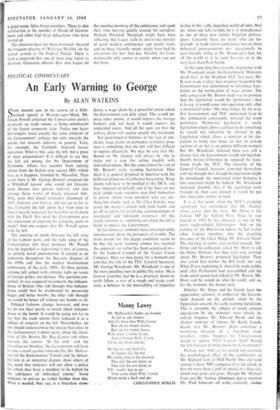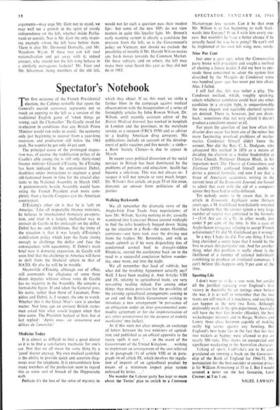POLITICAL COMMENTARY
An Early Warning to George
By ALAN WATKINS
C OME months ago, in the course of a little- noticed speech at Weston-super-Mare, Mr. Enoch Powell criticised the Conservative party's proposals on trade unions as being reminiscent of the fascist corporate state. Today one hears left-wingers make exactly the same criticism of the Government's policies not only towards the unions but towards industry in general. Take, for example, the Fairfields shipyard rescue operation. What is this, asks the left, but a piece of sheer corporatism? It is difficult to say that the left are wrong, for the Department of Economic Affairs has recently been seeking advice from the Italian state agency IRI—which was. as it happens, founded by Mussolini. Then again there is Mr. George Brown's proposal for a 'Whitehall tycoon' who would put Govern- ment finance into private industry and also arrange those works of Satan, takeover bids. Why, even that dread revisionist document of 1957, Industry and Society, did not go as far as this. Certainly the left admit that from time to time it may be necessary for Socialists to sit down with the Devil. But need the Government give the impression of enjoying his company quite so much? And one suspects that Mr. Powell agrees with the left.
This meeting of minds between the left wing of the Labour party and the right wing of the Conservatives (for these purposes Mr. Powell may be regarded as right-wing) is not, of course, an entirely novel phenomenon. It existed as an undertone throughout the Bevanite disputes of the 1950s and into the nuclear disarmament controversy of the early 1960s. At these periods extreme left joined with extreme right on issues of foreign policy and defence. The question con- cerned, or was supposed to concern, the indepen- dence of Britain. One side thought that indepen- dence could best be maintained by possessing bigger and better bombs; the other side thought we would be better off without any bombs at all.
Political fashions change, however, and now we do not hear nearly so much about indepen- dence or the bomb. It would be going too far to say that the trade unions have replaced it as a subject of concern on the left. Nevertheless, no one should underestimate the unease that exists in the parliamentary Labour party about the inten- tions of Mr. Brown, Mr. Ray Gunter and others towards the unions. 'In the end,' said the Guardian on Monday, 'the Government will have to take a stand against someone like Mr. McGar- vey (of the Boilermakers' Union) and, by defeat- ing him in an industrial dispute, show others of like mind that ministers will not allow a policy for which they have a mandate to be balked by the selfishness of individual unions.' Some ministers in private go rather further than this, What is .needed, they say,. is a first-class showr■
down, a wage claim by a powerful union which the Government can duly reject. This would im- press other unions, it would impress the foreign bankers and, not least, it would impress the undecided voters. And all the signs are that the railway claim will receive exactly this treatment.
Yet governmental firmness in the face of par- ticular wage claims or particular restrictive prac- tices is something that the left will find difficult to oppose effectively. We may be sure that Mr. Brown or Mr. Gunter will always be able to make out a case for acting toughly with individual unions. But the same cannot be said of Mr. Brown's early warning legislation. Here there is a general proposal to interfere with the hallowed processes of collective bargaining. Wage claims will have to be notified to the DEA, and fines imposed on default; and if the fines are not paid simple trade unionists may find themselves in prison. (Some trade unionists who are any- thing but simple. such as Mr. Clive Jenkins, may grasp the martyr's crown with both hands and go off to jail to the gratifying accompaniment of newspaper and television cameras.) AU this surely amounts to something on which the left is likely to oppose the Government.
So far, however, ministers have remained oddly unconcerned about the prospects of trouble. The main reason for this happy condition seems to be that the early warning scheme has received the approval—or rather has been acquiesced in— by the General Council of the Trades Union Congress. Here we may pause for a moment and consider the role of the TUC General Secretary, Mr. George Woodcock. Mr. Woodcock is one of the most puzzling men in public life today. He is forever asserting that he is a practical, down-to- earth fellow, a user of a rough and ready yard- stick, a believer in the inevitability of imperfect
justice in this sadly imperfect world of ours. And yet, when one talks to him, he is as metaphysical as one of those now extinct Hegelian philoso- phers. Certainly there are many who are im- pressed: at trade union conferences two or three industrial correspondents ma% occasionally be seen literally sitting at Mr. Woodcock's feet, for all the world as if he were Socrates or at the very least Jean-Paul Sartre.
At the same time there is some impatience with Mr. Woodcock inside the Government. Ministers recall that, at the Brighton TUC last year, Mr. Brown made it clear that whatever happened the Government was determined to introduce legis- lation on the notification of wage claims. The only concession Mr. Brown made was to promise that the legislation would be 'permissive'—that is to say, it would come into operation only after a ministerial order. (We may notice, by the way, that Government and TUC spokesmen have in this connection consistently misused the word permissive. Permissive legislation is surely legislation which allows a citizen to do something he would not otherwise be allowed to do. Legislation which allows a minister at his dis- cretion to bring into force an Act, or certain sections of an Act, is an entirely different matter.) But Mr. Woodcock believed there was still a chance that the Government would not legislate. Shortly before Christmas he opposed the legis- lation inside the TUC. The majority of the General Council, however, consoled themselves with the thought that, though the legislation might be introduced, the ministerial order bringing it into operation might be shelved. Mr. Woodcock muttered gloomily that if the legislation were brought in, then sure enough it would be put into operation sooner or later.
It is at this point, when the TUC's grudging agreement was announced, that Mr. Stanley Orme conies into the story. Mr. Orme is the Labour MP for Salford West. Since he was elected in 1964 he has emerged as one of the most single-minded left-wingers. And on the evening of the Rhodesian debate he led twelve other Labour members into the dauntini presence of the Chief Whip, Mr. Edward Short. The meeting, it seems, was cordial enough. Mr. Orme and his colleagues asked Mr. Short to tell the Prime Minister that they were very worried about Mr. Brown's proposed legislation. They also asked that neither the Bill itself, nor any White Paper explaining it, should be made public until after Parliament had reassembled and the trade union group had talked to Mr. Brown. Mr. Short said he would do what he could; and so, for the moment, the matter rests.
Whether Mr. Orme and his friends have the opportunity seriously to embarrass the Govern- ment depends on the attitude taken by the Opposition towards the early warning legislation. This is currently the subject of much anxious speculation by the ministers most closely in- volved. Suppose Mr. Edward Heath and the shadow minister of labour, Sir Keith Joseph, decide that Mr. Brown's plans constitute a monstrous invasion of a free-born trade unionist's rights. Suppose the Conservatives decide to oppose. What happens then? Would the left threaten to brine down the Government?
Perhaps not. And yet we should not overlook the psychological effect of the candidature of Mr. Richard Gott at Hull North. One old hand among Labour MPs compares it to the cloud, at first no more than a puff of smoke in a blue sky, which may grow and grow. Though Mr. Michael Foot and Mr. Sydney Silverman,.not to mention Mr. Paul Johnson—all using curiously similar
arguments—may urge Mr. Gott not to stand, we may well see a growth in the spirit of sturdy independence on the left, whether inside Parlia- ment or outside. Nor is Mr. Gott the only inspir- ing example w horn the left have before them. There is also Mr. Desmond Donnelly, and Mr. Woodrow Wyatt. If these two can kill steel nationalisation and get away with it, indeed prosper, why should not the left wing behave in a similarly outrageous fashion? Mr. Foot and Mr. Silverman, being members of the old left, would not let such a question pass their modest lips: but some of the new MPs do not view matters in quite this loyalist light. Mr. Brown's early warning system is clearly a candidate for pressure from the left; so is the Government's policy on Vietnam; nor should we exclude the possibility of trouble if Mr. Harold Wilson makes any fresh moves towards the Common Market. On these subjects. and on others, the left may make their voice heard this year as they did not do in 1965.



































 Previous page
Previous page